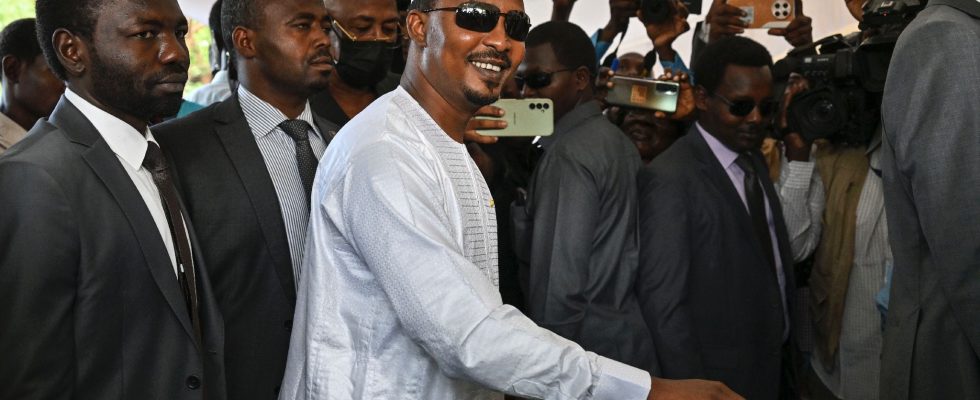He controls the country with an iron fist. General Mahamat Idriss Déby Itno was declared the winner of the presidential election on Thursday May 9, three years after taking power at the head of a military junta, in a vote questioned by the opposition and international NGOs.
He received 61.03% of the vote, according to provisional official results from the electoral commission he appointed. He beat his Prime Minister Succès Masra, who contested this victory, and who only collected 18.53% of the votes, according to these results which must still be validated by the Constitutional Council, which was also appointed by the leader of the junta.
Eight other candidates shared the crumbs of the votes and Albert Pahimi Padacké, former Prime Minister (2016-2018) who came in third position, called the winner and “wished him every success in the exercise of his mandate”, according to a statement relayed by Alwihda Info, a Chadian weekly. The participation rate officially rose to 75.89%, announced the president of the National Election Management Agency (ANGE) who announced the results.
Success Masra contests victory and calls for mobilization
“In view of this large victory, I am now the elected president of all Chadians,” said Mahamat Idriss Déby Itno in a very brief televised speech in a monotone tone, promising to implement his “commitments”. This election was to mark the end of a three-year military transition and many observers considered it a foregone conclusion in favor of the general, proclaimed leader on April 20, 2021 to replace his father Idriss Déby Itno who had just been killed by rebels on their way to the front, after having ruled for 30 years, this vast Sahelian country, one of the poorest in the world.
The fiercest slayer of “the Déby dynasty” then, the economist Succès Masra finally joined the junta and the general named him Prime Minister four months before the election. The rest of the opposition, muzzled and violently repressed, sometimes in bloodshed, had accused him of being a “traitor” and of being a presidential candidate to “give a democratic and pluralist veneer” to an election played out of advance for Déby.
But the opponent surprised everyone by gathering considerable crowds during his campaign. He affirmed on Thursday evening, in a long speech on Facebook published before the announcement of the results, that he was elected in the first round, accusing the camp of Mahamat Idriss Déby Itno of having rigged the results to announce the victory of the general. Invoking the compilation of ballot counts by his own supporters, he called on Chadians to “not let victory be stolen from them” and to “prove it” by “mobilizing peacefully, but firmly.”
If his supporters protest the election in the streets, this could open the way to deadly violence, with opposition demonstrations being systematically repressed in this country marked, since its independence from France in 1960, by coups. State, authoritarian regimes and the regular assaults of a multitude of rebellions.
A vote questioned by NGOs and the EU
In tune with the rest of the opposition which called for a boycott of the vote, the International Federation for Human Rights (FIDH) expressed concern on May 3 about an “election which seems neither credible, nor free, nor democratic.” “in a deleterious context marked by […] the increase in human rights violations.
On Sunday, four Chadian civil society organizations, including the Chadian Human Rights League (LTDH), protested against the refusal of the electoral commission to issue accreditations to 2,900 of their members for “observation of the ballot”, despite requests submitted “within the required deadlines”. The European Union (EU) deplored this sidelining a few days later, which it said was harmful to the “transparency” of the presidential election. The EU political mission in Chad “supported a Chadian citizen observation with EU funds”, Sona Jarosova, head of the mission, told AFP.
On Wednesday, Succès Masra’s party, “Les Transformateurs”, denounced “serious threats” against its leader and his supporters as well as “violence and arbitrary arrests” targeting the latter since the election.
General Déby was dubbed upon his installation by the army in 2021 by an international community, France in the lead, quick to condemn the putschists elsewhere in Africa. Paris still maintains around a thousand soldiers in Chad, considered a pillar of the fight against jihadists in the Sahel, after French soldiers were expelled from Mali, Burkina Faso and Niger.
